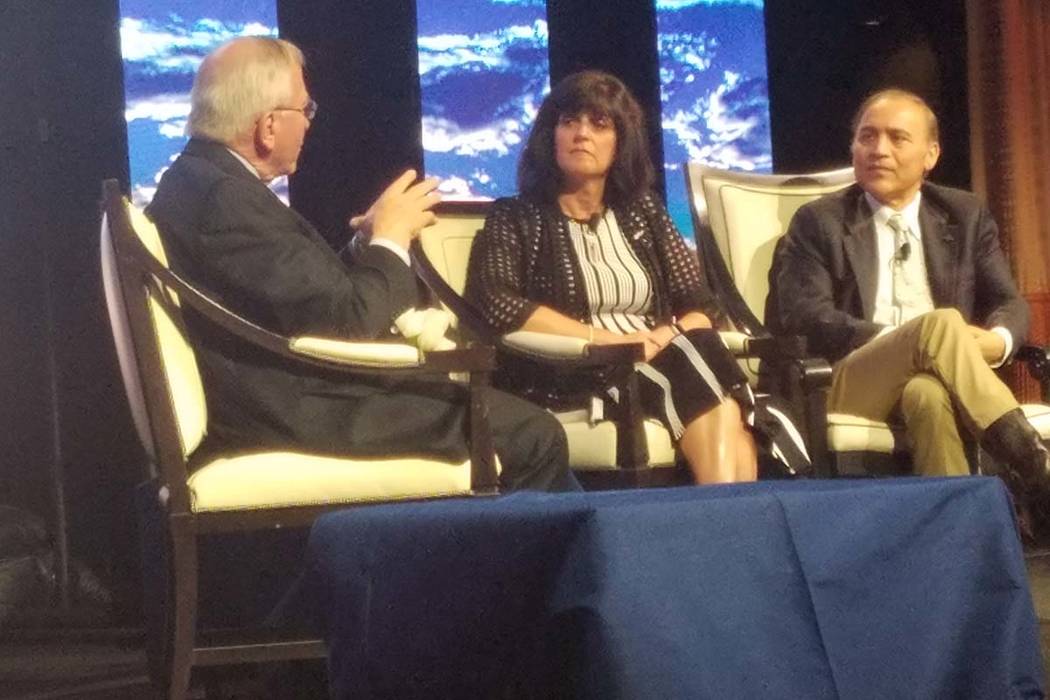McCarran boss urges airline-airport unity on improvements
Clark County Aviation Director Rosemary Vassiliadis said airlines and airports must work together to expand federal funding to keep infrastructure current in a time when technological advancements often outpace an airport’s ability to keep up with physical changes.
Vassiliadis discussed the battle over passenger facility charges during an airport chat segment of the 24th annual Boyd Group International Aviation Forecast Summit, a gathering of airport, airline and aircraft manufacturing executives.
The three-day event, which drew about 400 people to Encore, ended Tuesday with presentations by five manufacturers after two days of comments from executives of the world’s top airlines.
Vassiliadis made the case that airports and airlines must work together to preserve funding for airport infrastructure.
Airlines, through the Airlines for America, have lobbied to keep the collection of passenger facility charges — PFCs — at the level at which they were set in 2000, $4.50 per flight segment with a maximum of $18 per roundtrip.
All passengers pay PFCs on their flights depending how many stops their flights make and at what level PFC the airport collects. McCarran collects the maximum $4.50 per segment.
Funding for improvements
Airports argue that inflation has chipped away at the value of the amount of fees collected. In addition, airports are required to fund improvements needed to keep up with new technology, particularly in safety and security.
McCarran International Airport has received $3.8 billion of the $4.1 billion Nevada airports have received in grants funded by PFCs since 2008 according to the U.S. Department of Transportation.
In 2014, PFC collections nationwide totaled $3 billion. It climbed to $3.264 billion in 2017 and $3.367 billion in 2018.
Meanwhile, airports must monitor improvements they make resulting from changes in airport operations. For example, aircraft capacities have gauged higher over the years as airlines use bigger planes. In some cases, airports have had to make physical improvements — more durable apron surfaces to accommodate the greater weights of planes or modified clearances for aircraft winglets — for airline upgrades.
Improvements in airport access have changed dramatically with ride-hailing companies such as Uber and Lyft making more trips to the airport than taxicabs and modifications being necessary for those changes.
Airlines for America argues that airports already have plenty of cash on hand to fund needed improvements. The association said McCarran generated $679 million in airport revenue and PFC revenue of $94.6 million in 2018.
‘Fight isn’t benefiting anyone’
The battle over PFCs raged in Congress in 2014 when lawmakers debated reauthorizing the Federal Aviation Administration. A proposal to raise PFCs by $4 to $8.50 per flight segment failed as airlines, argued that a fee increase would amount to an undue tax that would reduce demand for air travel.
But Vassiliadis argued that not funding airport improvements could lead to demand reductions.
“The fight isn’t benefiting anyone,” she said in her conversation with Boyd Group International President and CEO Mike Boyd. “To be on opposite sides, at the end of the day, is going to affect the passenger and that passenger is going to make a decision — and it’s a discretionary decision — whether to fly and if it’s a miserable experience, they’re going to choose not to fly. Airlines and airports need to work together on all these other types of things that we always work together on. We’ve made this the dynamic and robust industry that it is.”
Vassiliadis said McCarran’s Terminal 3, which opened in 2012, would never have been built without PFC funding.
Airlines also have a say in airport improvements through an airline committee that meets annually with Vassiliadis and her management team about projects under consideration.
Costs are divided among several revenue sources, including the airlines, and, in some cases, grant applications involving PFC money.
McCarran officials explain the airport’s needs and receive feedback from the committee, which can vote for or against proposed improvements.
Sometimes the debates involve whether an improvement is essential to the airport and beneficial to the airlines.
Future debates may involve transportation systems to and from the airport.
Contact Richard N. Velotta at rvelotta@reviewjournal.com or 702-477-3893. Follow @RickVelotta on Twitter.























